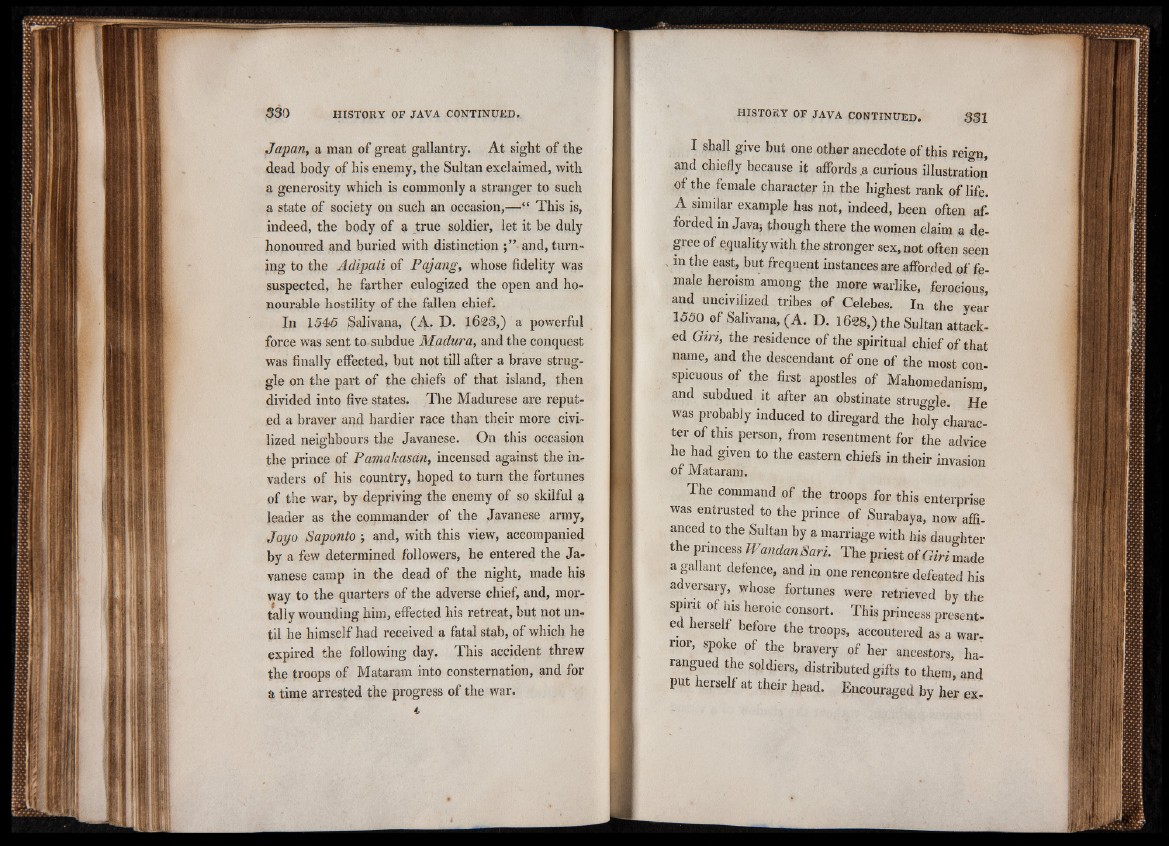
Japan, a man of great gallantry. At sight of the
dead body of his enemy, the Sultan exclaimed, with
a generosity which is commonly a stranger to such
a state of society on such an occasion,— “ This is,
indeed, the body of a true soldier, let it be duly
honoured and buried with distinction and, turn»
ing to the Adipati of Pajang, whose fidelity was
suspected, he farther eulogized the open and honourable
hostility of the fallen chief.
In 154>6 Salivana, (A. D. 1623,) a powerful
force was sent to-subdue Madura, and the conquest
was finally effected, but not till after a brave struggle
on the part of the chiefs of that island, then
divided into five states. .The Madurese are reputed
a braver and hardier race than their more civilized
neighbours the Javanese. On this occasion
the prince of Pamakasan, incensed against the invaders
of his country, hoped to turn the fortunes
of the war, by depriving the enemy of so skilful a
leader as the commander of the Javanese army,
Joyo Sapunto ; and, with this view, accompanied
by a few determined followers, he entered the Javanese
camp in the dead of the night, made his
way to the quarters of the adverse chief, and, mortally
wounding him, effected his retreat, but not until
he himself had received a fatal stab, of which he
expired the following day. This accident threw
the troops of Mataram into consternation, and for
a time arrested the progress of the war.
4,
0 aucvuuie ui tins reign,
and chiefly because it affords .a curious illustration
of the female character in the highest rank of life.
A similar example has not, indeed, been often afforded
in Java* though there the women claim a degree
of equality with the stronger sex, not often seen
m the east, but frequent instances are afforded of female
heroism among the more warlike, ferocious
and uncivilized tribes of Celebes. In the year
2550 of Salivana, (A. D. 1628,) the Sultan attacked.
Gin, the residence of the spiritual chief of that
name, and the descendant of one of the most conspicuous
of the first apostles of Mahomedanism,
and subdued it after an obstinate struggle. He
was probably induced to diregard the holy diameter
of this person, from resentment for the advice
he had given to the eastern chiefs in their invasion
or Mataram.
The command of the troops for this enterprise
was entrusted to the prince of Surabaya, n o w *
anced to the Sultan by a marriage with his daughter
the princess WandanSari. The priest of made
a gallant defence, and in one rencontre defeated his
adversary, whose fortunes were retrieved by the
spirit of his heroic consort. This princess present,
ed herself before the troops, accoutered as a war-
nor, spoke of the bravery of her ancestors, ha-
rangued the soldiers, distributed gifts to them, and
put herself at their head. Encouraged by her ex